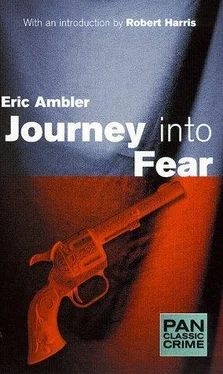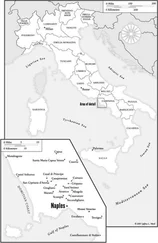Eric Ambler - Journey Into Fear
Здесь есть возможность читать онлайн «Eric Ambler - Journey Into Fear» весь текст электронной книги совершенно бесплатно (целиком полную версию без сокращений). В некоторых случаях можно слушать аудио, скачать через торрент в формате fb2 и присутствует краткое содержание. Год выпуска: 1940, ISBN: 1940, Издательство: Knopf, Жанр: Шпионский детектив, на английском языке. Описание произведения, (предисловие) а так же отзывы посетителей доступны на портале библиотеки ЛибКат.
- Название:Journey Into Fear
- Автор:
- Издательство:Knopf
- Жанр:
- Год:1940
- ISBN:9780307949967
- Рейтинг книги:5 / 5. Голосов: 1
-
Избранное:Добавить в избранное
- Отзывы:
-
Ваша оценка:
- 100
- 1
- 2
- 3
- 4
- 5
Journey Into Fear: краткое содержание, описание и аннотация
Предлагаем к чтению аннотацию, описание, краткое содержание или предисловие (зависит от того, что написал сам автор книги «Journey Into Fear»). Если вы не нашли необходимую информацию о книге — напишите в комментариях, мы постараемся отыскать её.
Journey Into Fear — читать онлайн бесплатно полную книгу (весь текст) целиком
Ниже представлен текст книги, разбитый по страницам. Система сохранения места последней прочитанной страницы, позволяет с удобством читать онлайн бесплатно книгу «Journey Into Fear», без необходимости каждый раз заново искать на чём Вы остановились. Поставьте закладку, и сможете в любой момент перейти на страницу, на которой закончили чтение.
Интервал:
Закладка:
He became conscious of the revolver pressing against his chest. Supposing they decided to search him! But no, they wouldn’t do that. They’d taken one revolver from him, and another from Mr. Kuvetli. They would scarcely suspect that there was a third. There were five other men in the car, and four of them at least were armed. He had six rounds in the revolver. He might be able to fire two of them before he himself were hit. If he waited until Banat’s attention had wandered he might get off three or even four of them. If he were going to be killed, he’d see that the killing was as expensive as possible. He got a cigarette out of his pocket and then, putting his hand inside his jacket as if he were looking for a match, snicked off the safety catch. For a moment he considered drawing the revolver there and then, and trusting to luck and the driver’s swerving to survive Banat’s first shot; but the gun in Banat’s hand was steady. Besides, there was always a chance that something unexpected might happen to create a better opportunity. For instance, the driver might take a corner too fast and wreck the car.
But the car purred steadily on. The windows were tightly shut, and Banat’s attar of roses began to scent the air inside. The man in the ulster was becoming drowsy. Once or twice he yawned. Then, obviously to give himself something to do, he brought out a heavy German pistol and examined the magazine. As he replaced it, his dull pouched eyes rested for a moment on Graham. He looked away again indifferently, like a passenger in a train with the stranger opposite to him.
They had been driving for about twenty-five minutes. They passed through a small straggling village with a single fly-blown-looking café with a petrol pump outside it, and two or three shops, and began to climb. Graham was vaguely aware that the fields and farmlands which had flanked the road till then were giving way to clumps of trees and uncultivatable slopes, and guessed that they were getting into the hills to the north of Genoa and west of the railway pass above Pontedecimo. Suddenly the car swung left down a small side road between trees, and began to crawl in low gear up a long twisting hill cut in the side of a wooded slope.
There was a movement by his side. He turned quickly, the blood rushing up into his head, and met Moeller’s eyes.
Moeller nodded. “Yes, Mr. Graham, this is just about as far as you are going.”
“But the hotel …?” Graham began to stammer.
The pale eyes did not flicker. “I am afraid, Mr. Graham, that you must be very simple. Or can it be that you think that I am simple?” He shrugged. “No doubt it is unimportant. But I have a request to make. As you have already caused me so much trouble, discomfort and expense, would it be asking too much of you to suggest that you do not cause me any more? When we stop and you are asked to get out, please do so without argument or physical protest. If you cannot consider your own dignity at such a time, please think of the cushions of the car.”
He turned abruptly and nodded to the man in the ulster who tapped on the window behind him. The car jerked to a standstill, and the man in the ulster half rose and put his hand down on the latch which opened the door beside him. At the same moment Moeller said something to Banat. Banat grinned.
In that second Graham acted. His last wretched little bluff had been called. They were going to kill him, and did not care whether he knew it or not. They were anxious only that his blood should not soil the cushions he was sitting on. A sudden blind fury seized him. His self-control, racked out until every nerve in his body was quivering, suddenly went. Before he knew what he was doing, he had pulled out Mathis’s revolver and fired it full in Banat’s face.
Even as the din of the shot thudded through his head, he saw something horrible happen to the face. Then he flung himself forward.
The man in the ulster had the door open about an inch when Graham’s weight hit him. He lost his balance, and hurtled backwards through the door. A fraction of a second later he hit the road with Graham on top of him.
Half stunned by the impact, Graham rolled clear and scrambled for cover behind the car. It could, he knew, last only a second or two now. The man in the ulster was knocked out; but the other two, shouting at the tops of their voices, had their doors open, and Moeller would not be long in picking up Banat’s gun. He might be able to get in one more shot. Moeller, perhaps …
At that moment chance took a hand. Graham realised that he was crouching only a foot or so away from the car’s tank, and with some wild notion of hindering the pursuit should he succeed in getting clear, he raised the revolver and fired again.
The muzzle of the revolver had been practically touching the tank when he pulled the trigger, and the sheet of flame which roared up sent him staggering back out of cover. Shots crashed out, and a bullet whipped by his head. Panic seized him. He turned and dashed for the trees, and the slope shelving away from the edge of the road. He heard two more shots, then something struck him violently in the back, and a sheet of light flashed between his eyes and his brain.
He could not have been unconscious for more than a minute. When he came to he was lying face downwards on the surface of dead pine needles on the slope below the level of the road.
Dagger-like pains were shooting through his head. For a moment or two he did not try to move. Then he opened his eyes again and his gaze, wandering inch by inch away from him, encountered Mathis’ revolver. Instinctively he stretched out his hand to take it. His body throbbed agonisingly, but his fingers gripped the revolver. He waited for a second or two. Then, very slowly, he drew his knees up under him, raised himself on his hands and began to crawl back to the road.
The blast of the exploding tank had scattered fragments of ripped panelling and smouldering leather all over the road. Lying on his side amid this wreckage was the man in the workman’s cap. The mackintosh down his left side hung in charred shreds. What was left of the car itself was a mass of shimmering incandescence, and the steel skeleton buckling like paper in the terrific heat was only just visible. Farther up the road the driver was standing with his hands to his face, swaying as if he were drunk. The sickening stench of burning flesh hung in the air. There was no sign of Moeller.
Graham crawled back down the slope for a few yards, got painfully to his feet and stumbled away, down through the trees towards the lower road.
CHAPTER TWELVE
It was after midday before he reached the café in the village and a telephone. By the time a car from the Turkish Consulate arrived, he had had a wash and fortified himself with brandy.
The Consul was a lean, business-like man, who spoke English as if he had been to England. He listened intently to what Graham had to say before he said much himself. When Graham had finished, however, the Consul squirted some more soda water into his vermouth, leaned back in his chair and whistled through his teeth.
“Is that all?” he inquired.
“Isn’t it enough?”
“More than enough.” The Consul grinned apologetically. “I will tell you, Mr. Graham, that when I received your message this morning, I telegraphed immediately to Colonel Haki, reporting that you were very likely dead. Allow me to congratulate you.”
“Thank you. I was lucky.” He spoke automatically. There seemed to be something strangely fatuous about congratulations on being alive. He said: “Kuvetli told me the other night that he had fought for the Gazi and that he was ready to give his life for Turkey. You don’t, somehow, expect people who say that sort of thing to be taken up on it so quickly.”
Читать дальшеИнтервал:
Закладка:
Похожие книги на «Journey Into Fear»
Представляем Вашему вниманию похожие книги на «Journey Into Fear» списком для выбора. Мы отобрали схожую по названию и смыслу литературу в надежде предоставить читателям больше вариантов отыскать новые, интересные, ещё непрочитанные произведения.
Обсуждение, отзывы о книге «Journey Into Fear» и просто собственные мнения читателей. Оставьте ваши комментарии, напишите, что Вы думаете о произведении, его смысле или главных героях. Укажите что конкретно понравилось, а что нет, и почему Вы так считаете.












